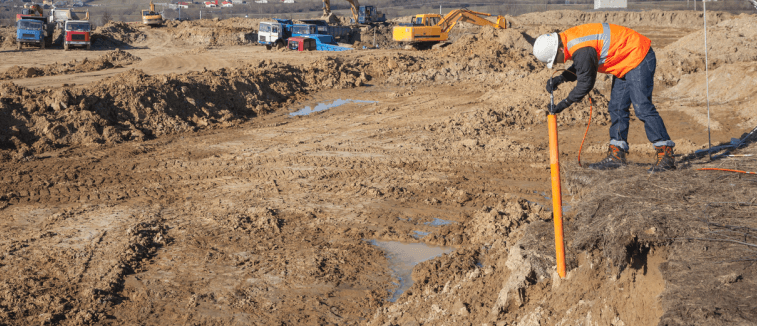All About Geotheta
All About Geotheta
Blog Article
5 Simple Techniques For Geotheta
Table of ContentsThe 6-Second Trick For GeothetaThings about GeothetaSome Known Facts About Geotheta.More About Geotheta8 Easy Facts About Geotheta Shown

They conduct site examinations, accumulate samples, carry out lab tests, and examine information to review the viability of the ground for construction projects - Consulting Engineers. Based on their findings, geotechnical designers provide recommendations for foundation style, incline security, keeping frameworks, and mitigation of geotechnical dangers. They team up with other specialists, such as designers, structural engineers, and building teams, to guarantee that geotechnical considerations are incorporated right into the total job design and application
By examining the habits and homes of soil and rock, they can identify potential geotechnical hazards such as landslides, dirt negotiation, or slope instability. Their know-how assists stop failings or mishaps that might jeopardize lives and building. Below are some thorough duties and duties of a geotechnical designer: Site Investigation: Geotechnical designers conduct website investigations to gather information on subsurface conditions.
They translate the data to recognize the properties and behavior of the dirt and rock, including their toughness, leaks in the structure, compaction features, and groundwater problems. Geotechnical Evaluation and Style: Geotechnical designers evaluate the data collected during website examinations to assess the security and viability of the website for building projects. They perform geotechnical estimations and modeling to review aspects such as bearing ability, negotiation, slope security, side earth pressures, and groundwater circulation.
Geotheta for Beginners
Structure Design: Geotechnical designers play an essential role in designing foundations that can securely support the designated framework. They evaluate the dirt conditions and load requirements to figure out the appropriate structure kind, such as shallow structures (e.g., grounds), deep foundations (e.g (https://ameblo.jp/geotheta/entry-12862281966.html)., heaps), or specialized methods like soil renovation. They take into consideration variables such as settlement restrictions, birthing capacity, and soil-structure communication to develop optimum structure designs
They assess building strategies, screen site tasks, and conduct area assessments to confirm that the design referrals are adhered to. If unanticipated geotechnical issues emerge, they analyze the circumstance and provide suggestions for remediation or adjustments to the style. Threat Assessment and Reduction: Geotechnical designers evaluate geotechnical threats and risks related to the project website, such as landslides, liquefaction, or dirt erosion.

Collaboration and Interaction: Geotechnical engineers work very closely with other experts associated with a job, such as engineers, structural designers, and building groups. Efficient communication and cooperation are necessary to integrate geotechnical factors to consider right into the overall job design and building procedure. Geotechnical designers provide technological competence, solution queries, and make certain that geotechnical requirements are satisfied.
Geotheta - Truths
Right here are some kinds of geotechnical designers: Structure Designer: Structure designers concentrate on designing and evaluating foundations for structures. They examine the dirt conditions, load requirements, and site attributes to establish the most appropriate foundation type and style, such as superficial structures, deep foundations, or specialized techniques like pile structures.
They evaluate the variables affecting incline stability, such as soil properties, groundwater conditions, and incline geometry, and develop strategies to avoid incline failings and reduce risks. Earthquake Designer: Quake engineers focus on evaluating and creating frameworks to endure seismic forces. They evaluate the seismic risk of a website, assess dirt liquefaction possibility, and establish seismic design standards to guarantee the safety and strength of frameworks throughout earthquakes.
They perform area testing, accumulate samples, and assess the gathered information to define the dirt buildings, geologic formations, and groundwater problems at a website. Geotechnical Instrumentation Engineer: Geotechnical instrumentation designers focus on tracking and gauging the habits of dirt, rock, and frameworks. They install and maintain instrumentation systems that keep track of factors such as dirt settlement, groundwater levels, incline movements, and architectural variations to evaluate efficiency and provide early cautions of potential problems.
All About Geotheta
They conduct examinations such as triaxial tests, combination examinations, straight shear examinations, and leaks in the structure tests to gather data for geotechnical analysis and style. Geosynthetics Designer: Geosynthetics designers specialize in the design and application of geosynthetic materials, such as geotextiles, geogrids, and geomembranes. They make use of these products to boost dirt stability, reinforce slopes, supply water drainage solutions, and control disintegration.
They often tend to be investigatory people, which implies they're intellectual, introspective, and inquisitive. They are interested, systematic, reasonable, analytical, and logical. Some of them are additionally social, indicating they're kind, generous, cooperative, patient, caring, helpful, empathetic, sensible, and friendly - Consulting Engineer.
In the office environment, geotechnical designers use specialized software application devices to do computations, create styles, and analyze information. They prepare reports, evaluation job requirements, interact with clients and employee, and coordinate task their explanation activities. The workplace setting gives a favorable setting for research study, evaluation, and cooperation with other specialists included in the task.
Get This Report on Geotheta
They frequently check out task sites to carry out website examinations, evaluate geotechnical problems, and collect information for evaluation. These sees entail traveling to different places, often in remote or tough terrains. Geotechnical engineers may do dirt sampling, conduct tests, and screen building and construction activities to guarantee that the geotechnical elements of the task are being implemented appropriately.
Geotechnical designers likewise work in specialized geotechnical laboratories. Geotechnical laboratory engineers function thoroughly in these settings, handling testing tools, running tools, and tape-recording information.
Report this page